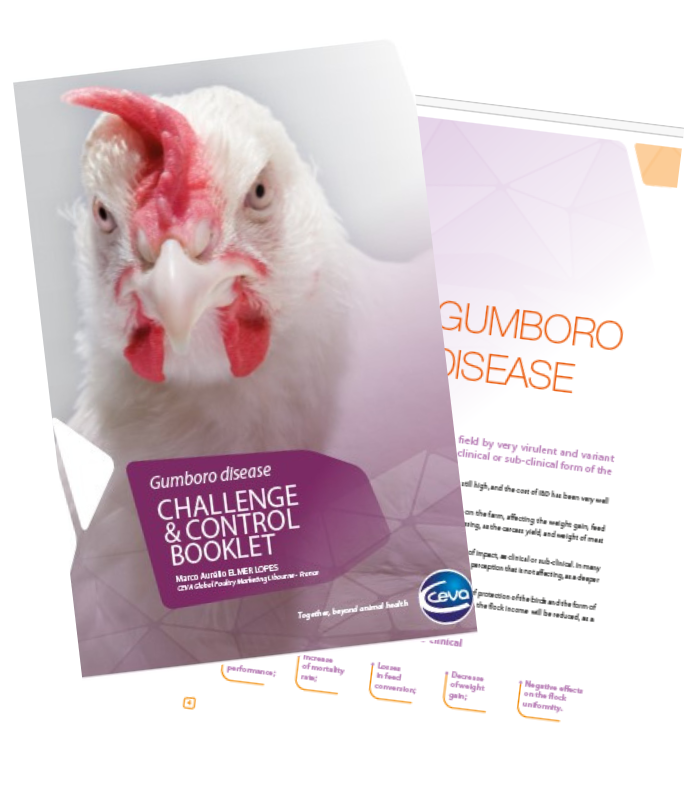New developments in the area of vaccines and vaccination equipment to control viral diseases in poultry such as Infectious Bursal Disease (IBD) have significantly improved the implementation and simplification of IBD control. Continuous evidence over the years shows that a well designed IBD vaccination program at the hatchery, administered either by In-Ovo or subcutaneous routes, is very safe and effective.
Additionally, the convenience of hatchery vaccination ensures a highly efficient process of uniform vaccine administration with very skilled and trained workers to ensure the correct preparation and application of the vaccine.
Infections Bursal Disease (IBD) commonly known as Gumboro disease requires early immunization at the hatchery. This disease is different from other poultry viral diseases such as Newcastle, infectious bronchitis, or infectious laryngotracheitis, where viruses are introduced each time to the flocks by external sources. Hatchery vaccination against IBD can be done using two kinds of vaccine technology, namely the immune-complex or the vector technology.
Immune-Complex vaccine was developed to ameliorate the constant global threat of IBDV. It is called immune-complex, because it is a suspension of a live attenuated Gumboro virus (Intermediate plus strain) in combination with a balanced formulation of specific IBD antiserum. The Immune-Complex vaccine has distinctive advantages over other hatchery IBD vaccines, such as the HVT-IBD vectored vaccines, as follows:
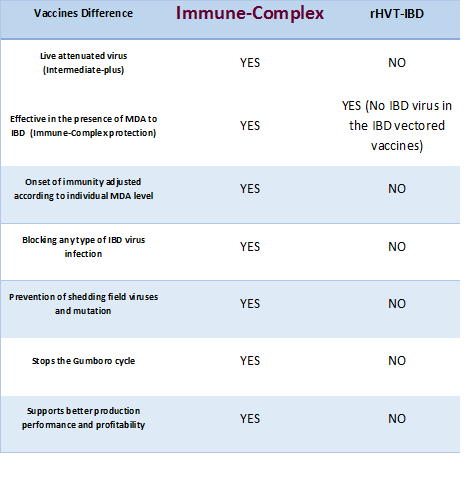
ONSET OF IMMUNITY
There are several factors involved in the onset of protection against IBD that should be considered to break the cycle of infections, flock after flock, such as:
- IBD resident virus in the farm: Related to the invasivity and pathogenicity of different field IBD virus strains prevalent in the farm.
- Field IBD virus pressure: Associated with environmental conditions favorable for the spread of the disease, such as sub-optimal biosecurity, poor quality management system, etc.
- Variable Passive Immunity: Varying levels of protective maternally-derived antibodies (MDA) transferred from breeder flocks having progeny with variable IBD passive immunity levels.
- Active Immunity: Release of the live attenuated virus from the immune-complex vaccine to fully colonize the bursa when MDA are reduced allowing the induction of active IBD immunity and consequently blocking field IBD viruses.
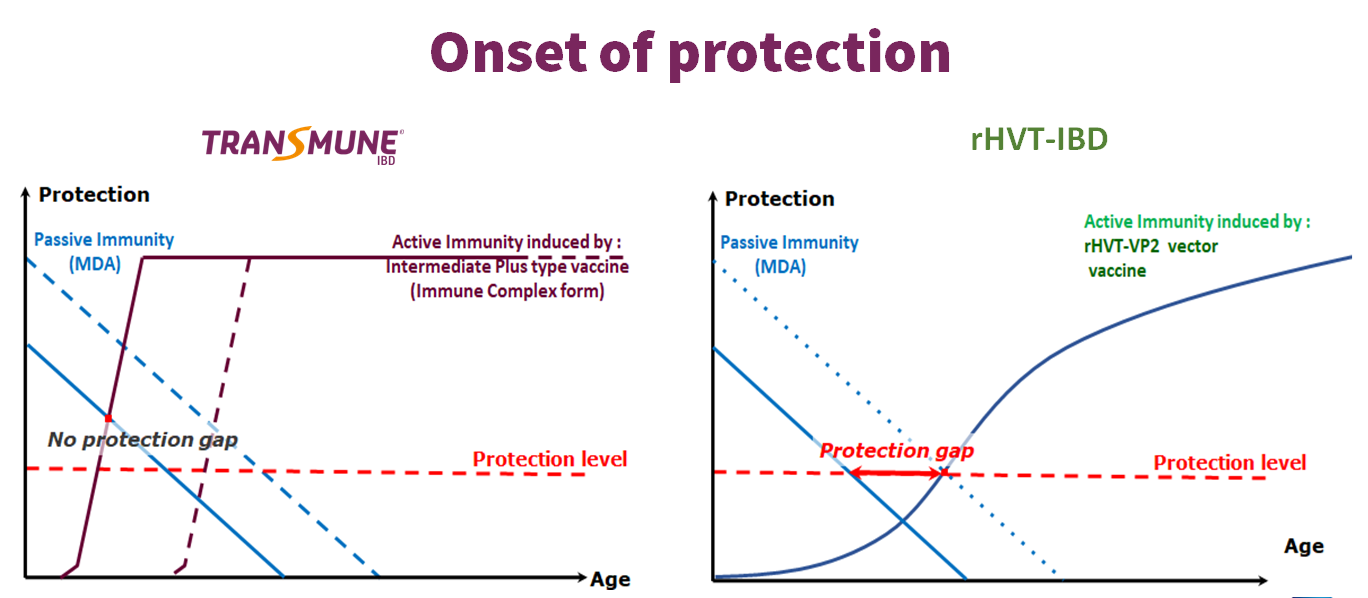
Figure 1. Live vaccine strain is released from the immune complex early and colonizes the bursa in comparison of vector IBD vaccines where onset of immunity is stable and only depends on HVT kinetics regardless of IBD MDA at hatch.
Immune-complex vaccinated broiler flocks have an active immune response as the passive immunity (MDA) decreases allowing the release of the live IBD vaccine virus. After the IBD virus is released, it reaches and colonizes the bursa inducing an active and sustained immune response blocking field IBD viruses and stopping the cycle of infection. In contrast, HVT-IBD vectored vaccines require longer time to activate a serological response to the VP2 expressed protein with a reduced control over the spectrum of IBD field viruses. Consequently, they are able to colonize the bursa, continuing the cycle of field IBD virus infections.
VACCINATED AND CHALLENGE WITH VERY VIRULENT AND VARIANT IBDV
In a controlled study, commercial broilers (Ross 308) carrying maternally-derived antibodies detected by Elisa (Biochek IBD AMT 1378 +/- 674) and a Virus Neutralization test (1629 +/- 1554), were used for a challenge study with a very virulent IBD virus (vvIBDV) or with a variant IBDV. The birds were distributed into three groups: Group 1 was vaccinated at day of age with the reference Immune-Complex vaccine. Group 2: Broiler chicks were vaccinated at day of age with a double insert rHVT vector vaccine. Group 3: Birds were left unvaccinated as positive controls. All birds were challenged at 4 weeks of age to be fair towards the expected onset of immunity. The IBD virus challenge was given at a dose of 104.0 EID50 /chicken applied orally of a very virulent strain isolated in Turkey (D407/2/04/TR) or a variant strain isolated from the Philippines (D1310/2/10/PH).
Immunity was assessed by IBD virus load in the bursa by RT-PCR at 5 and 10 days’ post-challenge (dpch).
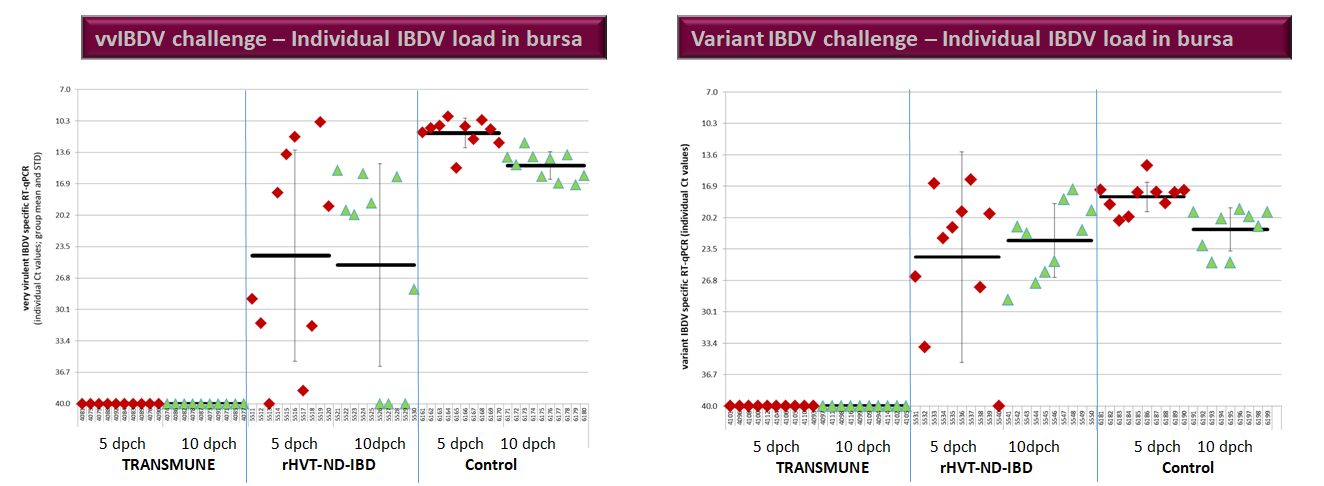
* DPCH = Days post-challenge
Figure 2. PCR Results in bursal tissue at 5 and 10 days’ post-challenge in the vaccinated groups with Transmune or rHVT-ND-IBD and the unvaccinated positive control.
Results of this study showed that vaccination in the Transmune group completely prevented the two challenge viruses’ replication in the bursa in all chickens in contrast with the group vaccinated with the HVT-IBD vector where the protection was 10% at 5 dpch and 30% at 10 dpch, based on RT-qPCR results (challenge virus was found in 9/10 samples at 5 dpch and 7/10 samples at 10 dpch in the rHVT-IBD group). Approximately 30% of vaccinated birds in the rHVT-IBD vector group showed a strong challenge virus replication in the bursa similar to the unvaccinated group.
COMPARATIVE PROTECTION AFTER IBDV CHALLENGE
A study was conducted to compare the protective immune response elicited by the Immune-Complex vaccine vs. an rHVT-IBD vectored vaccine against challenge with different IBD field viruses. Commercial broilers (Ross 308) were vaccinated with either vaccine at day of age and challenged at 28 days of age with different IBD field viruses showing a wide range of antigenic features, and isolated from different countries. Bursal samples were collected at days 4 post-challenged and were examined microscopically for bursal lesions inherent to an IBD virus infection. Bursa was considered fully protected when less than 10% of the follicles were affected by the challenge virus. This study shows a 100% protective response generated by the Immune-Complex live IBD virus vaccine at 4 and 14 days’ post-challenge regardless of the infectious IBDV. This demonstrates that this technology provides a robust and broad spectrum protection. A heterogeneous protection rate was observed in the group vaccinated with a rHVT-IBD vaccine. Protection of 100% was only achieved in one-time point of the study.
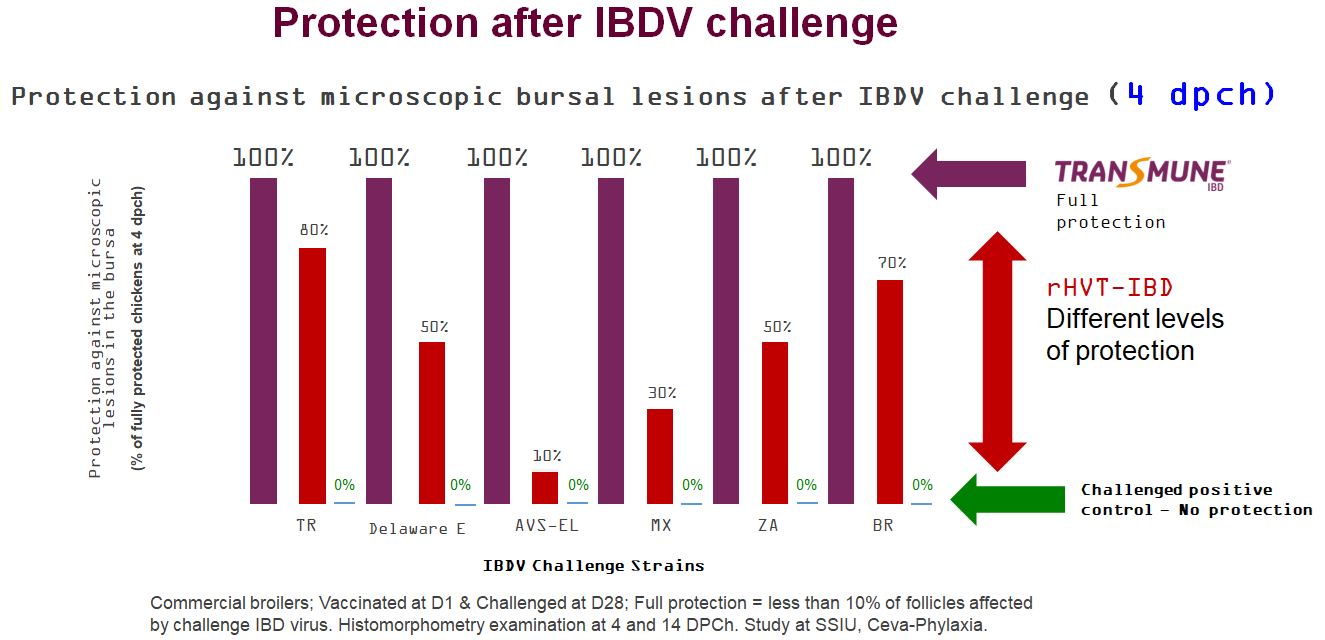
Figure 4. Bursa protection observed by microscopic lesions from vaccinated and non-vaccinated broilers at 4 DPCH.
PROTECTION AGAINST SHEDDING & SPREADING THE IBD VIRUS
Commercial broilers vaccinated with either Immune-Complex vaccine or a rHVT-IBD vectored vaccine were challenged with a vvIBD virus as well as an unvaccinated control group. Non-vaccinated broilers were commingled with either group to detect the virus shedding and transmissibility to susceptible broilers from the vaccinated & challenged birds. Results of the qPCR results from the bursal tissues of all broilers from each group demonstrated the absence of shedding and of spreading to unvaccinated contact birds only in the Immune-Complex vaccinated group. This demonstrates the efficacy of the Immune-Complex vaccine to stop the cycle of IBD field virus infections.
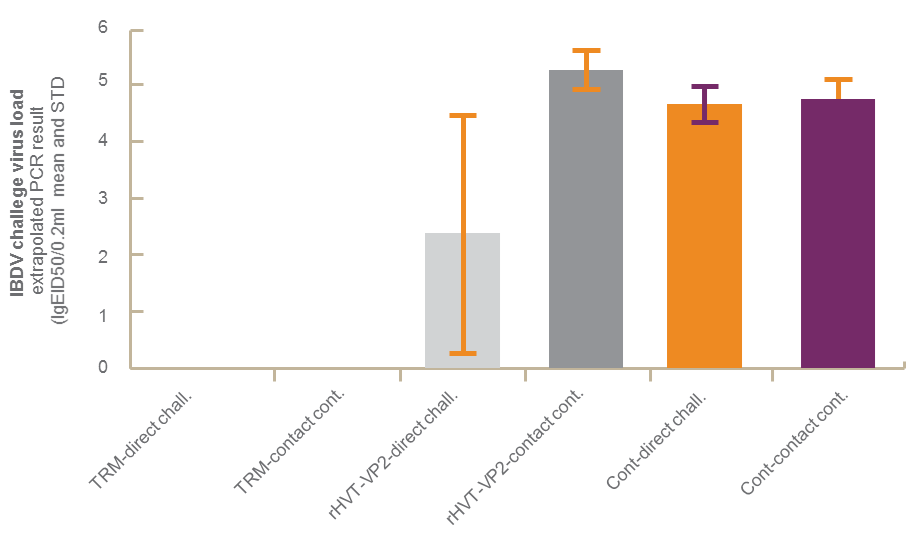
Figure 5. Efficacy of two IBD vaccination programs to stop shedding and spreading of IBD after virulent IBD virus challenge
It is noticeable that no very virulent IBD virus replication was detected either in the Immune-Complex vaccinated & challenged birds or their susceptible contact control birds. Measuring the amount of IBD virus detected by qRT-PCR in other groups vaccinated & challenged, there was an estimated reduction in virus replication of 5 logarithms base 10, i.e. 100,000 times.
DISPLACING IBD FIELD VIRUS
The figure below shows a comparison on virus detection by qPCR from bursas of broilers vaccinated with different IBD vaccination programs. These results were collected from 527 broiler flocks during a 4-year study (2013-2016). Field IBD virus replacement by the vaccine strain contained in the Immune-Complex vaccine has been consistently observed fully colonizing the bursa and blocking replication of field IBD viruses.
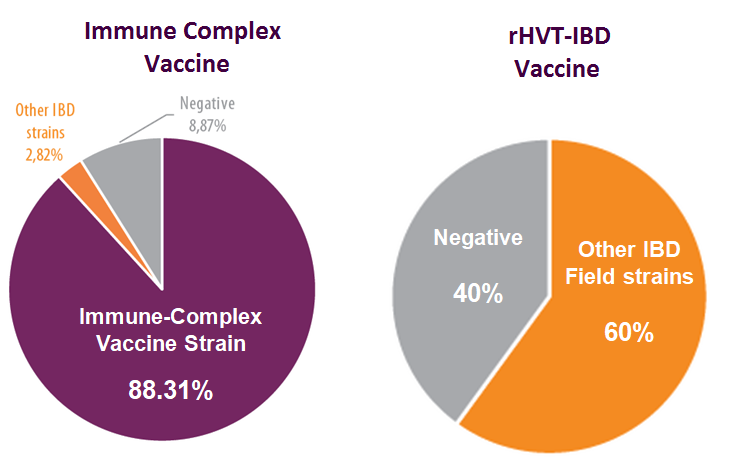
Figure 6. Comparative results of two vaccination programs against IBD virus. Detection by qPCR.
MONITORING VACCINATION EFFICIENCY
The figure 7 shows the results of 702 Transmune-vaccinated broiler flocks that were monitored for IBD vaccination efficiency. Consistent seroconversion within expected range values is commonly observed. On the other hand, monitoring the IBD serological profile of rHVT-IBD is low. Results obtained from 134 broiler flocks vaccinated with rHVT-VP2 showed inconsistencies in seroconversion showing IBD serological values higher than expected indicating field IBD virus challenge.
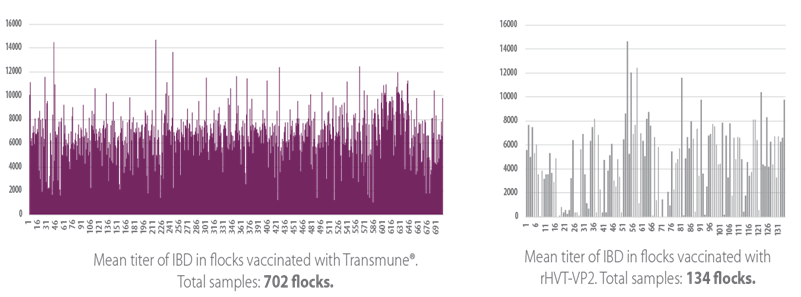
Figure 7. Comparative serological results from Immune-Complex or rHVT-IBD vaccinated broiler flocks (Biochek Elisa).
This is clear because the rHVT-IBD vectored vaccine does not replicate in the bursa since there is no live IBD virus. Vectored rHVT-IBD vaccine allows field IBD viruses to infect and replicate in the bursa, and be shed into the environment continuing the cycle of infection to susceptible birds.
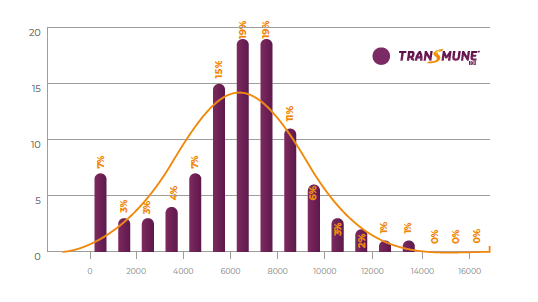
CONCLUSIONS
- An Immune-Complex live IBD vaccine is able to induce full protection against a wide range of Gumboro virus strains.
- The Immune-Complex vaccine protects against clinical signs as well as blocks field IBD virus replication and potential shedding in the environment avoiding virus transmission and mutation.



